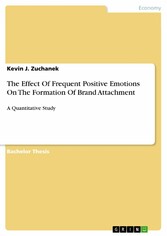The Effect Of Frequent Positive Emotions On The Formation Of Brand Attachment - A Quantitative Study
von: Kevin J. Zuchanek
GRIN Verlag , 2020
ISBN: 9783346175977
, 58 Seiten
Format: PDF
Kopierschutz: frei
Preis: 18,99 EUR
eBook anfordern 
Mehr zum Inhalt

The Effect Of Frequent Positive Emotions On The Formation Of Brand Attachment - A Quantitative Study
Bachelor Thesis from the year 2018 in the subject Business economics - Offline Marketing and Online Marketing, grade: 1,7, University of Wuppertal, language: English, abstract: This paper aims to show the effect of frequent positive emotions on the formation of brand attachment. Therefore, this paper will start by looking at several current research findings to determine definitions for divisive terms and to build up a conceptual framework which supports the constructed hypotheses on the formation of brand attachment. More endorsement is given by a realized quantitative study which researches positive emotions and constituents of dependent variables like brand attachment. Even though variances are inevitable, a study on the topic ought not to be rendered to be redundant, since the topic lacks scientific studies, in comparison to other economic fields, due to novelty. By juxtaposing the framework and study in opposition to the hypotheses, one will see to which extent frequent positive emotions lead to positive outcomes which results then find their way into marketing departments and provide action alternatives. Current researches have discovered that there is a connection between feeling good and attaching oneself to an entity. This entity referred in the past exclusively to human entities, however, economists are emphasizing the equality between human beings and inhuman entities, like brands. Happiness, as already mentioned, is a value which is hard to capture, because of the lack of a universal definition and also because feelings are difficult to inquire into due to the fact that present circumstances always have their effects on the current state of an individual. This makes variances in the measurement of happiness inevitable.









